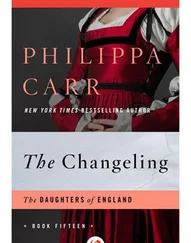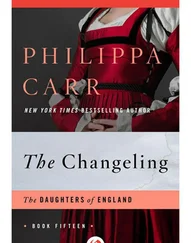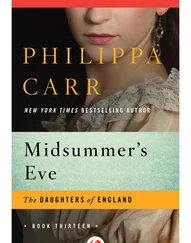Sometimes she wore her magnificent hair in curls tied back with ribbons, at others she dressed it high and set glittering ornaments in it. The children thought she must be a princess to possess such jewels and I hadn’t the heart to tell them that they were the cheapest paste. On her they looked real; she had the power to transform anything she put on.
We were all becoming quite knowledgeable about plays, and lessons often took the form of dramatic acting. She would assign our parts, taking the best for herself—but how could I blame her for that?—and rehearse us, promising us that when we were ready we would perform for the servants and the Lambards.
We were all caught up in the excitement, particularly myself.
She said to me once: “You would have done quite well on the stage, Arabella.”
She had completely won our hearts, and I was afraid that one day she would grow tired of us and decide to rejoin the company of players, but she showed little sign of doing that and seemed perfectly content with our way of life. She made a habit of coming to my room after the others were in bed and we would talk—or mostly she talked and I listened.
She would always sit near the mirror and now and then glance at her reflection. I had the impression that she was outside the scene, looking in on the play. Sometimes it seemed to amuse her.
One night she said: “You don’t know me, Arabella. You are as young as innocence and I am as old as sin.”
I was always a little impatient with these theatrical utterances, largely because I felt they impeded the truth and I was anxious to discover the truth about Harriet.
“What nonsense,” I said. “I am seventeen years old. Is that so young?”
“It is not necessarily years which determine our age.”
“But it is exactly that.”
She shook her head. “You are gloriously young at seventeen … whereas I at twenty …” she hesitated and looked at me mischievously … “two,” she added. “Twenty-two … yes, not a day more, but since I am in a confessing mood tonight, I will whisper to you that I have been twenty-two for more than a year and sometimes I am merely twenty-one.”
“You mean you pretend to be younger than you are!”
“Or older. Whichever seems expedient. I am an adventuress, Arabella. Adventurers are made by fate. If I had had what I wanted from life I shouldn’t have had to go out and adventure for it, should I? Then I should have been a high-born lady living quite contentedly. Instead of which I am an adventuress.”
“High-born ladies have become exiles, don’t forget, so perhaps they have to adventure a little in these times.”
“It’s true. The Roundheads have made schemers of us all. However, I always wanted to be an actress. My father was an actor.”
“That explains your talents,” I cried.
“A strolling player,” she mused. “They used to come through the villages and stay where business was good. It must have been very good in Middle Chartley, for they stayed long enough there for him to seduce my mother, and this seduction resulted in the birth of one destined to become the finest jewel in the world of the theatre. Your own Harriet Main.”
The tone of her voice changed. She was a wonderful actress. She could make me see the strolling player, the simple country maiden, who was enchanted by his performance on the stage and equally so it seemed by that other performance under hedges and in the fields of Middle Chartley.
“It was August,” said Harriet, “for I am a May baby. Little did that simple country maiden realize what would happen when she dallied in the cornfields with her lover. He was very good looking—she told me afterwards, for I never saw him, nor did she after they left, for she did not know then that besides planting the seeds of love in her heart he had planted something else in another part of her anatomy.”
Her conversation grew racy and there were times when I was unsure of what she meant, but I gradually learned; she certainly was educating us all—myself no less than the others.
“In those days,” she went on, “there were no women players. Their parts were played by boys, which was trying for strolling players if they wanted women. No wonder they looked to the village maidens to supply their needs. Sometimes they played in big houses … castles, mansions. That was what they looked for, but they did very well on the village greens, because there was little that appealed to country folk so much as fairs and strolling players. So he played his romantic roles, Benedict, Romeo, Bassanio … He was one of the leading players and took these roles on account of his good looks. It was a busy life for him—always on the move, learning new parts, searching for girls and persuading them to supply his needs. Oh, yes, he was very handsome. My mother said he was, and I don’t think she ever really regretted what happened.
“The players moved on and he promised to come back for her. She waited but he never came. She used to make up all sorts of reasons why he hadn’t come back. She thought he had been killed in a brawl, for he was a great fighter and, she said, would pick a quarrel as easily as wink his eyes if anyone upset him. But she had her own burden to bear. A child whose father had disappeared. It was a great crime in the eyes of those who had never had the inclination or opportunity to be other than virtuous. Of course some girls would have gone to the river—there was one conveniently close to Middle Chartley—but my mother was not the sort for it. She had always had a great zest for life and she believed there was something good round the corner. She refused to see the dark side, and even when it was presented to her, black as soot, she’d swear she could see the light round the corner. ‘Only a matter of waiting,’ she used to say. ‘It’ll sort itself out.’ But of course my existence soon become apparent, and there were scenes of recrimination in the cottage on the village green. All the maidens who had succeeded in not getting caught, as they called it, were deeply shocked by my mother who had; they had to show their horror to prove their own innocence, you understand. She lived through that time, she told me after, because she was always hoping that he would come back. I was born and my mother worked hard in the fields and I was a constant reproof to her; all the local men thought that being no longer a virgin she was there to provide sport for them. She learned how to fight, for she was determined, as she said, to wait for my father.
“I was five years old when we went to the Hall. Squire Travers Main had taken a fancy to her when he was riding by with the hounds. In fact so taken with her was he that he decided that my mother was more interesting prey than the fox. I was with her at the time and he stopped, so she told me, to compliment her on the pretty child … myself. He was a kindly man with a wife who had had a hunting accident a year or so before and was an invalid. He was no lecher. He had the occasional mistress, which was understandable with a wife in such a condition. However, the outcome was that my mother was invited to the Hall to be a housekeeper or serve in some way … in the beginning undefined, and she went on condition that I went with her.
“Our fortunes changed from that day. My mother was companion and lady’s maid to her ladyship, who was also rather taken with her, and from this it was a short step into the Squire’s bed. There were no children, and both the Squire and Lady Travers Main took an interest in me.
“I was taught to read and write, at which, my dear Arabella, I made great progress. By this time I had decided I would be a lady. I had had a taste of cottage life. I had been informed by village hobbledehoys that I was a bastard, and I found the taste bitter. It was different at the Hall. The Squire and his lady never called me bastard; indeed their attitude towards me suggested that far from being not on an equal footing with the village children, I was superior to them; and they were determined to make me more so.
Читать дальше












